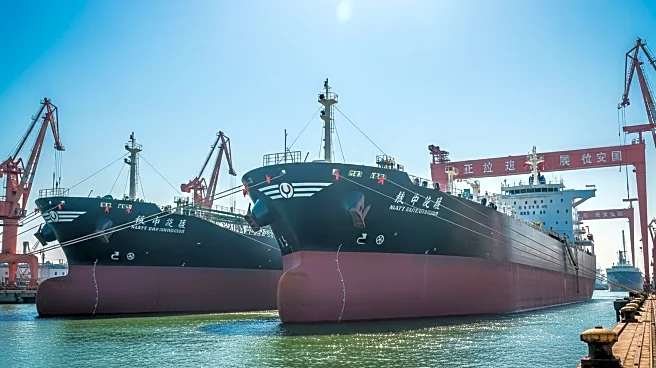What is the story about?
What's Happening?
NYK Stolt Tankers, a joint venture between NYK and Stolt Tankers, has signed a contract with Nantong Xiangyu Shipyard in China to construct two parcel chemical tankers. These vessels are scheduled for delivery in 2028 and 2029 and will join the chemical tanker pool operated by Stolt Tankers. The newly ordered vessels are large chemical tankers with a cargo capacity of 38,000 tons. They will feature stainless steel cargo holds capable of transporting various chemical products and incorporate energy-saving technologies, such as shore-side electricity supply during port stays, to enhance environmental sustainability. This order increases the total number of chemical tankers under construction to eight, including six vessels ordered from the same shipyard in 2024.
Why It's Important?
The expansion of NYK Stolt Tankers' fleet is significant in the context of rising demand for renewable energy and sustainable transportation solutions. Chemical tankers capable of transporting sustainable aviation fuel and other renewable fuels are expected to see steady demand growth. This move aligns with global efforts to achieve a decarbonized society, as the shipping industry seeks to reduce its environmental impact. The incorporation of energy-saving technologies in these vessels reflects a commitment to sustainability, which is increasingly important for stakeholders in the maritime industry. The expansion of the fleet also positions NYK and Stolt Tankers to better meet the growing demand for chemical transportation services.
What's Next?
As the delivery of these vessels is scheduled for 2028 and 2029, NYK and Stolt Tankers will likely continue to focus on fleet renewal and expansion to meet future demand. The shipping industry may see further investments in energy-efficient technologies and sustainable practices as companies strive to align with environmental goals. Stakeholders, including environmental groups and industry regulators, may closely monitor these developments to ensure compliance with sustainability standards. Additionally, the demand for chemical tankers capable of transporting renewable fuels is expected to grow, potentially leading to more orders and collaborations within the industry.
Beyond the Headlines
The decision to expand the fleet with energy-efficient chemical tankers highlights the broader trend of sustainability in the maritime industry. As global pressure mounts to reduce carbon emissions, shipping companies are increasingly investing in technologies that minimize environmental impact. This shift not only addresses regulatory requirements but also reflects changing consumer preferences for environmentally responsible practices. The long-term implications could include a transformation in fleet management strategies, with a focus on sustainability as a key competitive advantage.














